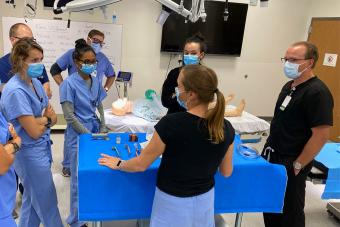Teaching Philosophy
The Red Rocks Community College Physician Assistant Program aims to create a collaborative environment that not only facilitates the learning of basic medical knowledge, but the application of learned knowledge through developed critical thinking. By utilizing a combination of lecture, hands-on practice, case-based learning, Interprofessional Education, and simulation students are encouraged to develop a strong foundational knowledge, mature as professionals, and become integrated collaborators and leaders in the healthcare workforce.
MPAS Curriculum Sequence
Each cohort starts on campus in August. Students continue through the Program as a full-time cohort in the order scheduled by the Program. All courses and academic activities are required. There is no provision for exemption of classes, part-time participation, advanced placement, or transfer of academic credit. Only those students who have been formally accepted by, and matriculated into, the Red Rocks Community College Physician Assistant Program can take courses within the MPAS program.
The PA Program faculty is continually reviewing and evaluating the overall curriculum, individual course content, and course sequencing. Therefore, course titles, credit hours, and sequencing may be changed without notice.
Course Descriptions can be found here.
The Didactic Curriculum
Didactic curriculum begins on campus in August. Students complete two consecutive semesters of full-time coursework and academic activities, followed by an additional 8 weeks of content, procedural training, and integration through case studies and simulation. After two Supervised Clinical Practice Experiences, students return for one additional 6 week didactic block.
The program incorporates multiple learning strategies throughout the didactic curricula to enhance integration of knowledge.
- Problem-based learning (PBL) creates a dynamic environment that allows students to think critically and concentrate on problem solving. PBL is cased-based and helps students incorporate their medical knowledge into clinical-type situations.
- Systems-Based Curriculum (SBC) is the most commonly employed learning style in medical education. SBC is student-centric and has been shown to improve student understanding by allowing students to focus on the basic science and clinical science of a single system at a time. The program uses an organ system based approach throughout the first two didactic semesters. For example, students are learning anatomy, physiology, pathophysiology, history & physical exam, and clinical medicine of the cardiovascular system concurrently.
- The Arvada campus houses a mock clinic and high-fidelity mannequins allowing students to practice hands-on skills through simulations of clinical scenarios.
- The program further incorporates practicums, a procedure boot camp, and ultrasound education.
The nature of PA education is such that students must consider themselves full-time professional students. Accommodations or excused absences are not available for non-emergent family needs, childcare, employment, transportation, or other personal issues.
The Student’s Day During Didactic Training
PA students should expect to be in classes approximately 40 hours per week throughout the didactic year. Students are expected to be present in every class unless unusual circumstances require a leave of absence. On occasion, students will be required to participate in educational activities on weekend days or later evenings.
The PA curriculum is sufficiently intense to require the full attention of all students, regardless of academic or experiential background. Therefore, the Program does not make exceptions in class attendance or other requirements for students’ employment schedules, routine childcare needs, transportation or other non-emergent personal considerations.
The Clinical Curriculum
Students complete approximately 12 months of Supervised Clinical Practice Experiences (SCPEs). Each SCPE is 4-6 weeks long, and cumulatively, students are exposed to a variety of disciplines including family medicine, internal medicine, women’s health, pediatrics, emergency medicine, surgery, behavioral health and inpatient medicine. The clinical curriculum allows students to care for patients of all ages via a diversity of settings including outpatient offices, community health clinics, hospitals, operating rooms, long term care and rehabilitation facilities, the Department of Corrections, Indian Reservations, mobile units, large organizations, small provider owned practices, cities, suburbs and rural small towns.
In alignment with our mission, all students will complete SCPEs in rural and underserved areas. Students will be assigned to SCPEs in a variety of locations including other states and at training sites outside of the metropolitan Denver area. Students may suggest clinical experiences but are not required to obtain their own sites or preceptors. Students are required to accept rotation assignments as assigned by the Program. Students will be required to secure housing for clinical placements and will be financially responsible for associated costs. Program-covered AHEC housing may be available for in-state clinical placements.
Potential candidates who wish to read the policies and procedures governing the didactic and clinical curriculum may access the Physician Assistant Program Manual
